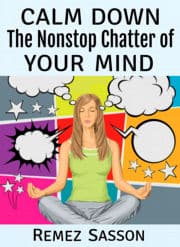
What Is Mental Calmness?
Let me start by saying that mental calmness has nothing to do with passivity and abstaining from action.
It also has nothing to do with a dull and uneventful life. How to define calmness? What does mental calmness mean? Let’s delve into this subject.
What Is Mental Calmness? – Definition
Browse our online courses on meditation, positive thinking, overcoming procrastination, confidence, and freedom from distractions.
How to define calmness in a few words?
Calmness is a state of mental and emotional tranquility and poise.
With this state of mind, you do not take things personally and do not get offended by what people say or do.
It is a state of mental relaxation, patience, tranquility, and poise.
This state of mind fosters patience, self-discipline, serenity, contentment, and peace of mind.
- A mentally calm person does not act impulsively and rashly and does not react with anger or restlessness.
- A mentally calm person is not agitated easily and does not allow worries and doubts to affect his or her thinking, behavior, and actions.
Mental calmness resembles a calm and quiet lake with no waves, unlike an agitated mind, which resembles an ocean with high and dangerous waves.
This state of mind enables you to handle your work, relationships, and your life calmly, effectively, and confidently. It will also improve the quality of your inner and outer life.
Mental Calmness Examples
1. You are in the company of a stressful person. You can either get stressed and anxious, too, or you can remember to stay calm, relaxed, and poised if you possess mental calmness.
2. Your boss yells at you. It does not matter whether it is because you did not finish a project on time, because you made a mistake, or because your boss is in a bad mood today. Instead of getting stressed and uptight, mental calmness would help you keep your poise and avoid the stress.
3. You make a plan, but it does not work out. If you lack mental calmness, you would probably get stressed, angry, frustrated. With a calm mind you will review your actions in an unbiased manner and decide on a different approach.
4. Do you react with anger and frustration when something breaks down, when you lose something, or when someone says nasty words about you? With a relaxed mindset you would stay calm and not affected mentally and emotionally.
5. Do you overthink? Do you keep repeating stressful thoughts in your mind, unable to let them go? Do you keep analyzing, thinking and worrying about unimportant matters? Mental calmness will set your mind free.
How to Gain Mental Calmness?
What to do to make your mind peaceful? How to bring peace into your mind?
Well, there are various ways to gain inner peace and calm mind, such as meditation, mindfulness and concentration, to name a few.
Let’s talk a little about each one of them.
Meditation and Calmness
Any meditation technique you practice will go a long way to calm your mind and give you mastery over your mind.
You can find several meditation techniques, here at this website.
A regular practice of meditation will give you tranquility, a serene mind and more control over your thoughts.
Meditation calms not only the body and relieves stress, but it also calms the mind.
Mindfulness and Calmness
This practice is very similar to meditation.
You sit down and focus on the sensations in your body, on your breath, or on your thoughts. It is a method that is gaining popularity in the last year.
For more information read the article Mindfulness – Focusing on the Present Moment and Living in the Now, where you will find more information.
Emotional Detachment Leads to Calmness
This practice teaches you not to take things personally, and stop being mentally and emotionally stirred and agitated
by what people say and do.
With emotional attachment you will learn to avoid being attached to thoughts, feeling and beliefs that limit you and cause you stress and discomfort.
This practice will also help you let go of your emotional burdens, so you can enjoy inner peace and happiness.
For more information, read about Emotional Detachment for Happier Life.
Focus and Concentration Leads to Control Over Your Mind and Thoughts.
improving your focus and concentration would give you greater control over your thoughts, and this would lead to a tranquil mind, free from meaningless and unnecessary thoughts.
How to improve your focus and concentration? You can take the first steps by practicing a few concentration exercises.
Our mind is constantly busy, every hour of the day. All kind of thoughts enter the mind, stay a little while, and then make room for other thoughts. Thoughts, ideas, worries and fears constantly capture the attention and occupy the mind.
This nonstop activity does not allow the mind to think clearly, to be sharp and focused, and to be calm.
When nonstop chatter and constant thinking do not occupy your mind, it becomes sharper, more focused, and therefore, more resourceful and more productive.
Calming down the nonstop chatter of your mind is one of the best ways to arrive to a state of mental calmness and mental peace, free from stress and worries.
This might seem as an unattainable goal, but it is attainable. Of course, this requires inner work and some effort on your part, but the rewards are great.
In my book, Calm Down the Nonstop Chatter of Your Mind, I offer a step-by-step program for stopping the restlessness of the mind and enjoying inner peace.
Benefits of Possessing a Calm Mind
Here are a few of the benefits:
- You learn to live in the present moment, not in the past, nor in the future.
- Your common sense, perception and efficiency increase.
- You stay calm and in control of yourself in difficult and stressful conditions.
- You act calmly and confidently, with no anger or restlessness.
- Your patience and inner strength increase.
- You progress faster if you are on the path of self-improvement or spiritual growth.
Words about Calmness to Remember
The mind is like a room that is always full with a lot of stuff. There is no free space there. When you empty your mind of this stuff, you make room for peace of mind.
Tranquility and inner peace stop the restlessness of the mind and silence futile and meaningless thoughts.
The wind creates waves in the ocean. Restless thoughts, like the wind, create waves and storms in the mind. As the ocean calms down when there is no wind, so the mind calms down when there are fewer thoughts.
“When we have inner peace, we can be at peace with those around us. When our community is in a state of peace, it can share that peace with neighboring communities.”
– The Dalai Lama
“When the mind is left without anything to cling to, it becomes still.”
– Sri Ramana Maharshi
“The more tranquil a man becomes, the greater is his success, his influence, his power for good. Calmness of mind is one of the beautiful jewels of wisdom.”
– James Allen
“First keep the peace within yourself, then you can also bring peace to others.”
– Thomas a Kempis
“Learn to be calm and you will always be happy.”
– Paramahansa Yogananda
“Without peace of mind, life is just a shadow of its possibilities.”
– Jean Borysenko
“Anxiety is like a rocking chair. It gives you something to do, but it doesn’t get you very far.”
– Jodi Picoult
Browse our online courses on meditation, positive thinking, overcoming procrastination, motivation, confidence, and freedom from distractions.


